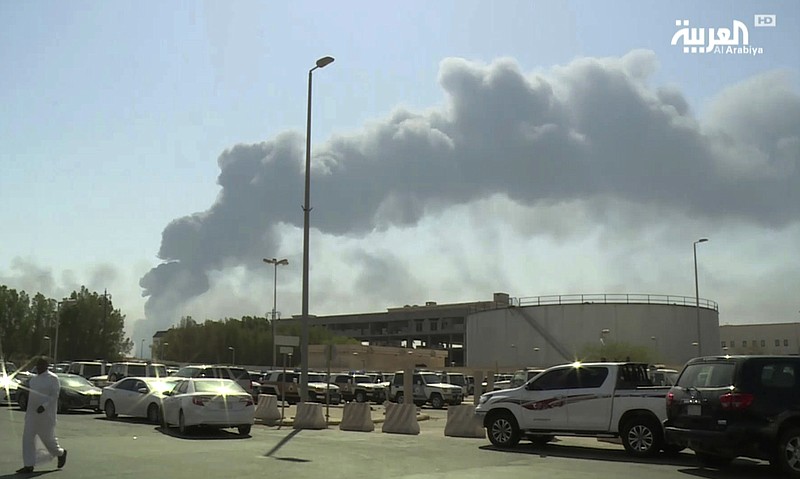WASHINGTON (AP) — The U.S. tried to build its case Monday that Iran was behind the fiery weekend attack on key Saudi Arabian oil facilities that raised new war worries and sent energy prices soaring. Iran denied responsibility, while President Donald Trump said the United States was “locked and loaded” to respond if necessary.
American officials released satellite images of the damage at the heart of the kingdom’s crucial Abqaiq oil processing plant and a key oil field, and two U.S. officials said the attacker used multiple cruise missiles and drone aircraft.
The Americans alleged the pattern of destruction suggested Saturday’s attack did not come from neighboring Yemen, as claimed by Iranian-backed Houthi rebels there. A Saudi military spokesman later made a similar accusation, alleging “Iranian weapons” had been used in the assault.
Iran rejected the allegations, and a government spokesman said there now was “absolutely no chance” of a hoped-for meeting between Iranian President Hassan Rouhani and Trump at the U.N. General Assembly next week.
For his part, Trump sent mixed signals, saying his “locked and loaded” government waited for Saudi confirmation of Iran being behind the attack while later tweeting the U.S. didn’t need Mideast oil “but will help our Allies!”
One U.S. official, speaking on condition of anonymity to discuss internal deliberations, said the U.S. was considering dispatching additional military resources to the Gulf but no decisions had been made. The U.S. already has the USS Abraham Lincoln aircraft carrier battle group in the area, as well as fighter jets, bombers, reconnaissance aircraft and air defenses.
Downplaying any talk of imminent U.S. military action, Vice President Mike Pence’s chief of staff, Marc Short, told reporters at the White House that the president’s language was “a reflection” that his administration was advancing policies that protect the U.S. “from these sorts of oil shocks.”
“I think that ‘locked and loaded’ is a broad term that talks about the realities that” the U.S. is “safer and more secure domestically from energy independence,” Short said.
The new violence has led to fears that further action on any side could rapidly escalate a confrontation that’s been raging just below the surface in the wider Persian Gulf in recent months. There have already been mysterious attacks on oil tankers that Washington blames on Tehran, at least one suspected Israeli strike on Shiite forces in Iraq, and the downing of a U.S. military surveillance drone by Iran.
Those tensions have increased ever since Trump pulled the U.S. out of Iran’s 2015 agreement with world powers that curtailed Iranian nuclear activities and the U.S. re-imposed sanctions that sent Iran’s economy into freefall.
Benchmark Brent crude prices gained nearly 20 percent in the first moments of trading Monday before settling down to over 10 percent higher as trading continued. A barrel of Brent traded up $6.45 to $66.67.
That spike represented the biggest percentage value jump in Brent crude since the run-up to the 1991 Gulf War that saw a U.S.-led coalition expel Iraqi dictator Saddam Hussein’s forces from Kuwait.
U.S. benchmark West Texas crude was up around 10 percent. U.S. gasoline and heating oil similarly were up.
The attack halted production of 5.7 million barrels of crude a day, more than half of Saudi Arabia’s global daily exports and more than 5 percent of the world’s daily crude oil production. Most of that output goes to Asia.
Yemen’s Houthi rebels, who have been targeted by a Saudi-led coalition since March 2015 in a vicious war in the Arab world’s poorest country, maintain they launched 10 drones that caused the extensive damage. They reiterated that Saudi oil sites remained in their crosshairs, warning foreign workers to stay away.
U.S. officials said the damage done to the north-facing parts of the facilities suggest the attack instead came across the Persian Gulf from Iraq or Iran. American officials have yet to offer substantial evidence to support their claims, though Iran in the past has relied on hard-to-attribute attacks or proxy forces to launch assaults against its enemies.
At a news conference, Saudi military spokesman Col. Turki al-Maliki said, “All the indications and operational evidence, and the weapons used in the terrorist attack, whether in Buqayq or Khurais, indicate with initial evidence that these weapons are Iranian weapons.”
Al-Maliki offered no immediate evidence to support his allegations, which came after Trump said the U.S. awaited word from Saudi Arabia about who it suspected launched the attacks.
Iraqi Premier Adel Abdel-Mahdi said he received a call Monday from U.S. Secretary of State Mike Pompeo, who confirmed the attack didn’t come from Iraq. The State Department did not immediately acknowledge what was discussed. Iraq is home to Iranian-backed Shiite militias who aided it in its fight against the Islamic State group.
Iranian Foreign Ministry spokesman Abbas Mousavi again denied the U.S. claims Monday, telling journalists the accusation was “condemned, unacceptable and categorically baseless.” Government spokesman Ali Rabiei meanwhile said a Trump-Rouhani meeting in New York as of now wouldn’t happen.

